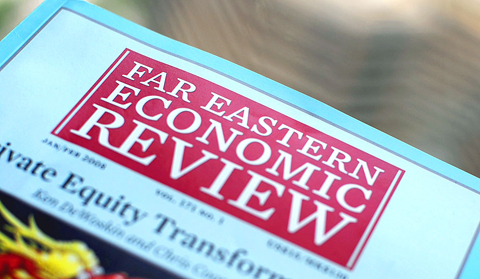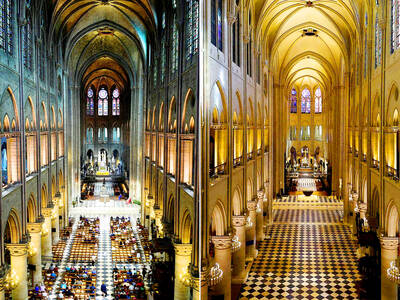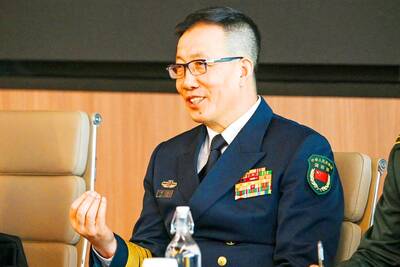The Far Eastern Economic Review (FEER), one of Asia’s leading print publications, will be shut down by News Corp as it struggles with losses and a dwindling readership migrating to the Internet.
The 63-year-old magazine, which was run by News Corp’s Dow Jones and enjoyed a weighty reputation for its fearless and in-depth Asian business and political coverage since World War II, will close in December, Dow Jones said.
The announcement marks the denouement of what observers and former staffers said had been a gradual decline in the fortunes of one of the great titles in Asian journalism, once considered essential reading for the region’s intelligentsia.

PHOTO: AFP
“The decision to cease publication of the Review is a difficult one made after a careful study of the magazine’s prospects in a challenging business climate,” said Todd Larsen, chief operating officer at Dow Jones Consumer Media Group.
In 2004, Dow Jones fired most of FEER’s reporters and transformed it into a monthly publication. Articles were largely commissioned and only a skeleton editorial staff was retained.
David Plott, FEER’s editor at the time, described the upheaval in 2004 as a loss of one of the “greatest concentrations of knowledge and expertise about the region assembled anywhere.”
The magazine’s demise comes as publishers gravitate toward electronic media and advertising revenues dwindle. In 2001, Asiaweek, another respected Asian weekly magazine, folded after 26 years.
“It’s paradoxical that as the region becomes more and more important, there are fewer and fewer publications producing quality coverage,” said Hugo Restall, FEER’s current editor.
Restall will remain on the editorial board of the Wall Street Journal, also run by Dow Jones.
A string of notable figures and correspondents have worked for FEER, including John King Fairbank, the Harvard sinologist, and the writer Ian Buruma.
Throughout its history, FEER’s investigative and critical journalism has sparked tussles with Asian governments. The magazine is currently embroiled in a legal battle with the Singapore government, with the island-state’s High Court ruling it defamed elder statesman Lee Kuan Yew (李光耀) and his son, Prime Minister Lee Hsien Loong (李顯龍).
FEER subsequently appealed the verdict.
“If we lose that then there’s a question of whether they want to try to enforce the judgment in Hong Kong. Conceivably it could continue,” Restall said.
Another FEER editor, Philip Bowring, also grappled with a lawsuit by the Singaporean government before he left the Review in 1992.

CHAGOS ISLANDS: Recently elected Mauritian Prime Minister Navin Ramgoolam told lawmakers that the contents of negotiations are ‘unknown’ to the government Mauritius’ new prime minister ordered an independent review of a deal with the UK involving a strategically important US-UK military base in the Indian Ocean, placing the agreement under fresh scrutiny. Under a pact signed last month, the UK ceded sovereignty of the Chagos archipelago to Mauritius, while retaining control of Diego Garcia — the island where the base is situated. The deal was signed by then-Mauritian prime minister Pravind Jugnauth and British Prime Minister Keir Starmer on Oct. 3 — a month before elections in Mauritius in which Navin Ramgoolam became premier. “I have asked for an independent review of the

France on Friday showed off to the world the gleaming restored interior of Notre-Dame cathedral, a week before the 850-year-old medieval edifice reopens following painstaking restoration after the devastating 2019 fire. French President Emmanuel Macron conducted an inspection of the restoration, broadcast live on television, saying workers had done the “impossible” by healing a “national wound” after the fire on April 19, 2019. While every effort has been made to remain faithful to the original look of the cathedral, an international team of designers and architects have created a luminous space that has an immediate impact on the visitor. The floor shimmers and

THIRD IN A ROW? An expert said if the report of a probe into the defense official is true, people would naturally ask if it would erode morale in the military Chinese Minister of National Defense Dong Jun (董軍) has been placed under investigation for corruption, a report said yesterday, the latest official implicated in a crackdown on graft in the country’s military. Citing current and former US officials familiar with the situation, British newspaper the Financial Times said that the investigation into Dong was part of a broader probe into military corruption. Neither the Chinese Ministry of Foreign Affairs nor the Chinese embassy in Washington replied to a request for confirmation yesterday. If confirmed, Dong would be the third Chinese defense minister in a row to fall under investigation for corruption. A former navy

‘VIOLATIONS OF DISCIPLINE’: Miao Hua has come up through the political department in the military and he was already fairly senior before Xi Jinping came to power in 2012 A member of China’s powerful Central Military Commission has been suspended and put under investigation, the Chinese Ministry of National Defense said on Thursday. Miao Hua (苗華) was director of the political work department on the commission, which oversees the People’s Liberation Army (PLA), the world’s largest standing military. He was one of five members of the commission in addition to its leader, Chinese President Xi Jinping (習近平). Ministry spokesman Colonel Wu Qian (吳謙) said Miao is under investigation for “serious violations of discipline,” which usually alludes to corruption. It is the third recent major shakeup for China’s defense establishment. China in June